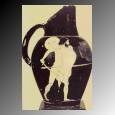The Homeric Style, "Odysseus' Scar" |
|
Be sure you read Genesis 22:1-19 before studying this discussion. |
Next reread Odyssey Book 19.272-508. |
"It would be difficult, then, to imagine styles more contrasted than those of the two equally ancient and equally epic texts. On the one hand, externalized, uniformly illuminated phenomena, at a definite time and in a definite place, connected together with lacuna in a perpetual foreground; thoughts and feelings completely expressed; events taking place in leisurely fashion and with very little of suspense. On the other hand, the externalization of only so much of the phenomena as is necessary for the purpose of the narrative, all else left in obscurity; the decisive points of the narrative alone are emphasized, what lies between is non existent; time and place are undefined and call for interpretation; thoughts and feeling remain unexpressed, are only suggested by the silence and the fragmentary speeches; the whole permeated with the most unrelieved suspense and directed toward a single goal (and that extent far more of a unity), remain mysterious and 'fraught with background.'" -- Erich Auerbach, Mimesis |
| Note, for example, that Homer can never let us be
in doubt about anything involving Odysseus, while Genesis leaves much open to
mystery. Homer must even recall what happened to Odysseus in the past rather than leave it
unexplained. On the other hand, Genesis does not explain to us Abraham's every motive. We are left to infer his obedience, fear, and love for both God and his son. The conflict in Homer's work is between characters and explicit struggles. The conflict for Abraham is internal: he struggles with himself. Equally, the gods in The Odyssey are predictably human, while the God of the Bible does not need to explain his every action to the reader. And, while Homer's work is meant to teach us, Scripture makes a claim on our obedience: |
||
Odyssey Book 19
|
Genesis
|
|
| Little suspense; digressions relax tension | Suspense in the present | |
| Already present in every part of his progress | Previous history defines us | |
| Nothing left "unexternalized," because everything is talked about | Much is left unexplained; motives are unclear | |
| No connection is left unhighlighted | God acts mysteriously | |
| Each scene is foregrounded: local, temporal present | Much is left unexplored | |
| Characters have alternating emotions | Characters are multi-layered, conflicted | |
| Exists more in the realm of myth than history | Absolute claim to history | |
| Offers to teach and entertain | Demands our reality be fitted to this reality. | |
| Clear, expressible conflict | Mysterious, below the surface conflict | |
adapted from Auerbach, Erich. Mimesis: The Representation of Reality in Western Literature. Trans. Willard R. Trask. Princeton: Princeton UP, 1953.

